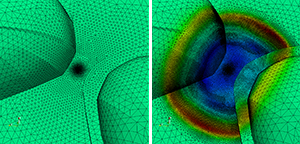Accurately modeling the flow of shockwaves across a fluid body can be a difficult thing to do. Attempts to address the problem by dialing up the computational accuracy of the models can actually make it worse. Now, researchers at the A*STAR Institute of High Performance Computing (IHPC) have come up with an innovative way that models shockwaves with a higher level of overall accuracy.
 Like scientists in many fields, researchers working in the field of computational fluid dynamics are accustomed to varying their models to suit the particular needs of their experiment. A scientist may test a fresh hypothesis with a low-order approximation that delivers a similarly low level of accuracy. He may follow that up by using a higher order model that is tuned to deliver more accuracy and similarity to real-world conditions. Simultaneously, he may tighten up the three-dimensional computational mesh to get more data into the equation.
Like scientists in many fields, researchers working in the field of computational fluid dynamics are accustomed to varying their models to suit the particular needs of their experiment. A scientist may test a fresh hypothesis with a low-order approximation that delivers a similarly low level of accuracy. He may follow that up by using a higher order model that is tuned to deliver more accuracy and similarity to real-world conditions. Simultaneously, he may tighten up the three-dimensional computational mesh to get more data into the equation.
While one may assume that the higher order model would deliver a better result, that is not the case when it comes to modeling shockwaves. As Vinh-Tan Nguyen of the IHPC explains, shockwaves are a special case.
“Simulating flows using high-order approximations triggers oscillations, which cause miscalculations at the front of shock waves where the flow is discontinuous,” Nguyen tells Phys.org. “It therefore becomes counterproductive to have high-order approximations in place right across shock regions.”
Nguyen and his team addressed this problem by basically de-tuning the model and using lower-order approximations in the specific regions where shockwave fronts are active, which they detect by using a sensor. The researchers simultaneously increased the resolution of the 3D computational mesh to compensate for the lower-order approximations.
Nguyen explains the outcome: “With precise detection through the shockwave sensor we can apply the right capturing scheme to treat each shockwave, regardless of its strength,” he tells Phys.org. “Our mesh adaptation procedure then simultaneously refines the mesh in shockwave regions and coarsens it in areas of least change, reducing computational costs significantly.”
The new technique is applicable to modeling any high-speed shockwave, and is an improvement over the previous approaches, which were specific to particular flow problems. The approach is expected to have real-world application in the fields of aerodynamics and blast analysis. The researchers say the computational scheme may also be useful for simulating the interface between air and water, which would be useful in the marine industry.
The IHPC was established in April 1998 under the Agency for Science, Technology and Research (A*STAR). The organization promotes and spearheads scientific advances and technological innovations through computational modeling, simulation and visualization methodologies and tools.
Related Articles
UCSC Ramps Up Astrophysics Work with New HPC Gear
Raijin Debuts as Fastest Supercomputer in Australia
Vampir Rises to the Occasion at ORNL



























































